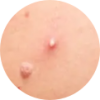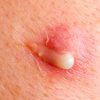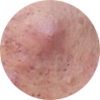How to prevent acne vulgaris
Since acne vulgaris is mostly caused by hormonal changes, there isn’t a lot you can do to control this. However, a range of lifestyle changes can compliment your treatment and skincare regime, to help keep the symptoms of acne vulgaris at bay.
- Wear sun protection: acne skin treatments and medication can increase your skin’s sensitivity to the sun, increasing the risk of sunburn and inflammation
- Avoid touching or picking at acne lesions: picking at acne increases the risk of scarring.
- Avoid foods that may cause flare-ups: dairy and foods with a high-glycemic index.
Treat your acne vulgaris at sk:n
Book a consultation to see a trained acne specialist at your nearest sk:n clinic for £25 and have your skin thoroughly assessed. You will receive an individual treatment plan and advice on a skincare routine that will help keep your acne vulgaris at bay.
Please note, if you are under 18 and would like to book a consultation for acne vulgaris treatment, you must have your consultation with a nurse and be accompanied by a parent or guardian. However, you can go on to have treatment without them in attendance. You may need to also have a consultation with a dermatologist depending on the severity of your acne.
At sk:n, we’re proud to have leading dermatologists treating acne vulgaris in our clinics across the UK, as well as a team of acne specialists who understand the medical causes behind acne vulgaris and the emotional impact on those who suffer from this condition.
At sk:n, we have the solutions to solve your acne concerns, for skin you love again.
Book your acne vulgaris consultation today and start your journey to clearer skin.
Related Conditions
Request a callback
One of our friendly sk:n advisors will call you to book your consultation.
- More than 450 consultants, doctors, nurses and medical practitioners
- Regulated by the Care Quality Commission, Health Inspectorate Wales and Health Improvement Scotland
- Partner of the NHS
- Rated excellent by our clients on Trustpilot
- Strict safety and care protocols







